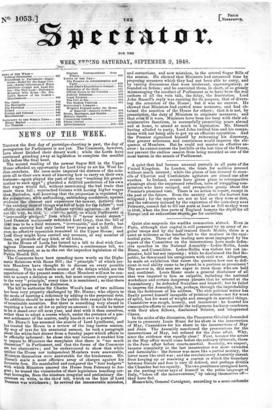NEWS OF THE WEEK.
THOUGH the first day of partridge-shooting is past, the day of prorogation for Parliament is not yet. The Commons, however, have about finished their dreary work ; while the Lords have continued grinding away at legislation to complete the needful bills before the final hour, The second reading of the newest Sugar Bill in the Upper House afforded an opportunity for Lord Grey to air his West In- dian crotchets. He once more imputed the distress of the colo- nists all to their own want of knowing how to carry on their own business—again played the part of the boy "teaching his grand- mother to suck eggs" ; glorified a fulfilled prediction of his own that wages would fall, without mentioning the bad trade that made them fall ; reproached Guiana with having higher wages than Barbados, well knowing that the proportion is regulated by the population • viith unflinching, unblushing confidence, against evidence the Clearest and experience the newest, declared that "the existing state of things was full of hope for the future"; and affably cautioned the West Ipdians against agitation—as that - not the way, he said, `.;., ..,Cer -he pohey -to which Parliament is "irrevocably pledged," from which it "never would depart."•Lord Denman maliciously reminded Lord Grey, that the bill of
1846 was to be a final measure, " irrevocable," and so forth; but that its eternity had only lasted two years and a half. how- ever, no effective opposition remained in the Upper House ; and Lord Grey might have carried any measure, or any number of them, on grounds of any kind, or all kinds. In the House of Lords has turned up a bill to deal with Con- tagious Diseases and Public Nuisances; a continuance bill, we believe, enlarged, so as to eke out the imperfect legislation of the Public Health Bill.
The Commons have been spending more words on the Diplo- matic Relations with Rome Bill ; the "principle" of which cer- tain Members have thought fit to discuss on every possible occasion. This is one fertile source of the delays which are the Opprobrium of the present session—that Members will not be con- tent to accept a decision as such, but must reopen every question to the veryprinciple " every time it is mentioned ; so that there can be no progress in the discussion. The bill to authorize Sir Charles Wood's loan of two millions has been very properly challenged by Mr. Hume; who objects to the mode of meeting a deficiency by adding to the perpetual debt. No addition should be made to the public debt except in the shape of terminable annuities. But there is something very absurd in requiring a loan at all for so paltry an amount : it would be better to let it stand over till next year, and deal with it then ourselves, rather than to adopt a course which, under the pretence of a pre- sent settlement of the matter, really hands it over to posterity.
Mr. Disraeli has assumed the mantle of Lord Lyndhurst, and has treated the House to a review of the long barren session. By way of text for his senatorial sermon, he took a paragraph about the white-bait dinner from a Sunday paper which affects to be officially informed : he chose this text because it enabled him to impute to Ministers the complaint that there is "too much discussion" in Parliament, and that the forms of the Commons are too obstructive ; and he endeavoured to show that while neither the House nor independent Members were answerable, Ministers themselves were answerable for the hinderance. Mr. Disraeli made a most effective array of charges against his favourite foes. He marshalled and compared the "four budgets" with which Ministers amused the House from February to Au- gist; he traced the vicissitudes of their legislation touching cor- rupt boroughs, from the nineteen irregular and preliminary dis- cussions on writs, to the third bill, which on the hint of Lord Denman was withdrawn; he revived the innumerable mistakes,
and corrections, and new mistakes, in the several Sugar Bills of the session. He showed that Ministers had consumed time by proposing measures which they had not been able to carry, and by raising discussions that were irrelevant, supererogatory, or founded on fiction; and he convicted them, in short, of so grossly mismanaging the conduct of Parliament as to have been the real authors of all the vain talk, the delay, the frustration. Lord John Russell's reply was cunning for its purpose, that of divert- ing the attention of the house; but it was no answer. He showed that Ministers had carried some measures, and had ob- tained the sanction of the House for others ; that it is not, by prescription, the duty of Ministers to originate measures; and that even if it were, Ministers have been too busy with their ad- ministrative functions, in successfully preserving peace abroad and at home, to attend so much to legislation. Mr. Disraeli having alluded to party, Lord John twitted him and his compa- nions with not being able to get up an effective opposition. And the Premier signalized himself by reiterating his discovery, that greater selectness and conciseness would improve the elo- quence of Members. But he could not muster an effective an- swer: he cannot restore the lost bills or the lost time of the House, nor prevent the endless session from being recorded as one of the most barren in the annals of Parliament.


























